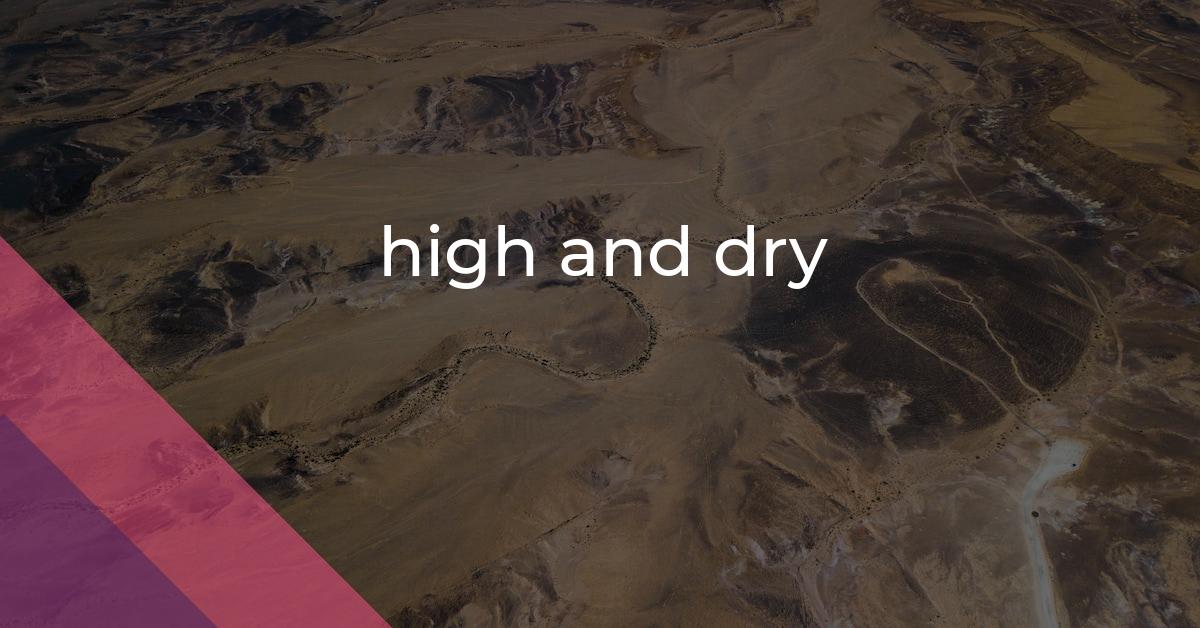high and dry: Idiom Meaning and Origin
What does ‘high and dry’ mean?
"High and dry" is an idiom that means to be left in a difficult or helpless situation, especially without any assistance or support.

Idiom Explorer
The idiom "up shit creek without a paddle" refers to being in a difficult or hopeless situation without any means of help or assistance.
The idiom "leave someone high and dry" means to abandon or forsake someone in a difficult or helpless situation without any support or assistance.
The idiom "in a bind" means to be in a difficult or challenging situation where there are not many options or solutions available.
The idiom "high and mighty" means that someone is arrogant, haughty, or acting superior to others. It refers to someone who thinks they are better or more important than everyone else.
The idiom "hang out to dry" means to leave someone in a difficult or vulnerable situation without support or assistance.
The idiom "get wet" means to be exposed to or experience something new or unfamiliar, often in a difficult or challenging way. It implies facing a novel situation that may be uncomfortable or outside one's comfort zone.
The idiom "fish out of water" refers to a person who feels uncomfortable or out of place in a particular situation or environment.
Left stranded and deserted
The idiom "high and dry" is a commonly used phrase in the English language. It is known to have originated from nautical terminology, specifically referring to ships or boats being stranded on land due to the receding tide. The term "high and dry" indicates a state of being left stranded or abandoned with no assistance or support.
The literal meaning of the idiom refers to the situation where a vessel is left high above the waterline as the tide retreats, leaving it stuck on the dry land. This situation is undesirable for any ship or boat since they are designed to be in the water and fulfill their purpose. Being "high and dry" in this sense suggests a lack of fluidity, functionality, and being left in an inconvenient or disadvantageous position.
Metaphorically, "high and dry" is commonly used to describe situations where individuals or groups find themselves left without assistance or resources. The idiom conveys a sense of helplessness, vulnerability, or abandonment experienced in various contexts, such as personal relationships, business dealings, or even logistical challenges. When someone is "left high and dry," they are left in a vulnerable position without any support or aid.
The idiom "high and dry" has close equivalents in several other languages, highlighting its universal appeal and the common experience of feeling abandoned or stranded across cultures. In Spanish, for example, the equivalent phrase is "quedar en la estacada," which means to be left in the lurch or left hanging. This suggests that the feeling of being "high and dry" is not unique to the English language, but rather a universal human experience.
Another related idiom is "leave someone high and dry." This phrase is often used to describe a situation where someone is abandoned or left without any support or assistance. It emphasizes the act of leaving someone in a vulnerable or disadvantageous position, similar to being "high and dry." For example, if a friend promises to help you move but doesn't show up, they have left you high and dry, alone to handle the task.
"hang out to dry" is another idiom related to "high and dry." This phrase is often used to describe the act of leaving someone to face the consequences of their actions alone, without any aid or support. It conveys a sense of abandonment and vulnerability, similar to being "high and dry." For instance, if a colleague takes credit for your work and you are left to face the criticism, you can say that you were hung out to dry.
The idiom "up shit creek without a paddle" is also related to being "high and dry." This phrase is a colloquialism used to convey a situation where someone is in deep trouble or in a difficult predicament with no way out. It suggests a sense of vulnerability, helplessness, and being stranded, similar to the feeling of being "high and dry." For example, if you are lost in a remote area with no map or supplies, you can say that you are up shit creek without a paddle.
The idiom "hell or high water" is yet another idiom related to "high and dry." This phrase is often used to convey a determination to persevere or overcome obstacles, regardless of the challenges. It suggests a sense of resilience and the willingness to face any difficulties that come one's way, even if it means braving through hell or high water. This idiom is related to being "high and dry" as it conveys the message that one is willing to face any adversity or hardship that comes their way.
The idiom "high and dry" originated from nautical terminology but has evolved to describe situations of abandonment, vulnerability, and being left without support or resources. It is widely used across different contexts and languages, highlighting its universal appeal. The related idioms "leave someone high and dry," "hang out to dry," "up shit creek without a paddle," and "hell or high water" all convey similar feelings of vulnerability, abandonment, or facing difficult predicaments. These idioms enhance the understanding and usage of the phrase "high and dry," making it a part of everyday vocabulary for English speakers around the world.
Example usage
Examples of how the idiom high and dry can be used in a sentence:
- She was left high and dry when her car broke down in the middle of nowhere and she didn't have any cell reception.
- After the storm hit, many houses were left high and dry due to the flooding.
- The company abruptly closed, leaving its employees high and dry without any severance packages or job prospects.
More "Adversity" idioms



